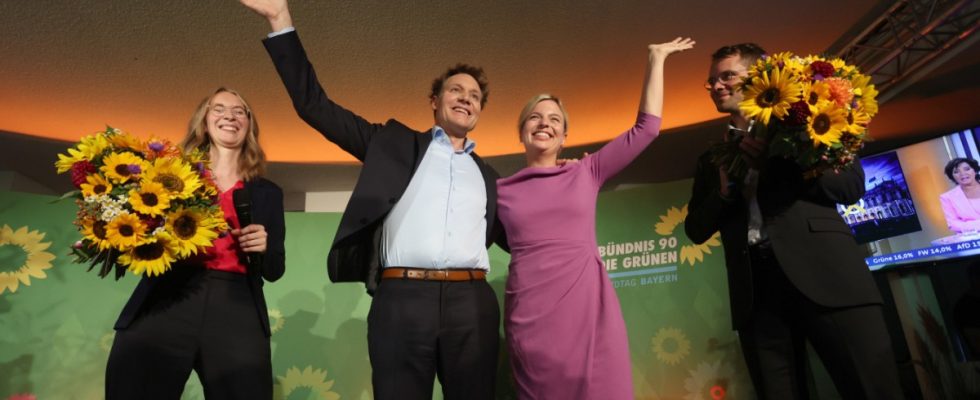Federal Chairwoman Ricarda Lang and Minister of State for Culture Claudia Roth will do the talking for the Greens. She emphasizes that this result is, one way or another, the second best for the Greens in Bavaria. “We are firmly anchored” in Bavaria, that is the language that the leading Greens have come up with. Top candidate Katharina Schulze also uses this formulation in her first TV statements in the Maximilianeum. Second best result ever, firmly anchored: Not much more can be said on this election evening, because the fact that the Greens, despite their second best result in the Free State, will not become the second strongest force in Bavaria again, will only become clear later in the evening.
At the beginning of the evening, the election forecasts commissioned by Bayerischer Rundfunk see the Greens still one percentage point ahead of the AfD – but the election researchers on ZDF see them already slightly behind. Two hours after the polls closed, a trend seems to have solidified in the projections: The Greens are now behind the AfD in both countries, and at best they would remain in third place in some projections and fourth in the others, and then behind there too the free voters.
The Greens see a shift to the right in all of this, regardless of their own position. Because the CSU and the Free Voters have not benefited from their populism, says the Green Party state chairwoman Eva Lettenbauer. Rather, the hostility towards the Greens stirred up by the two governing parties “mainly helped the AfD.” For the Greens it is now time to “fight against right-wing populism and this shift to the right”.
Decency and respect are other green keywords on this election evening. That’s what we need now, says Claudia Roth, among others, and if she and the other leading Greens had their way, then decency and respect would now require the Bavarian Prime Minister Markus Söder and his CSU to also talk to the Greens about a coalition . “What nonsense was it to try to define who belongs and who doesn’t belong,” shouts Roth, because Bavaria is not the CSU and the CSU is not Bavaria. “We are Bavaria,” says Schulze shortly afterwards.
And yet, as the evening progresses, the reviews become more and more cautious and the feelings more mixed. Despite how the wind was blowing in the Greens’ faces, they achieved “a pretty good result,” says Schulze’s co-leading candidate Ludwig Hartmann. Munich MP Christian Hierneis is still worried about the constituency he won in 2018. He is a little more reserved than Hartmann and calls the result “not that bad”. The DJ in the Muffathalle plays “Sing Hallelujah” anyway, and instead of just continuing to shake, the first guests go dancing. It’s the second best election result in Bavaria since ever. In Munich they will probably become the strongest party again. One of the last five Green direct mandates in Munich probably goes to the CSU, and the Greens cannot hold the one direct mandate in the city of Würzburg either.
The Greens achieved their best result in Bavaria in the 2018 state elections. At that time it was 17.6 percent, clearly the second strongest force with a whopping six percentage point lead over the Free Voters and a safe 7.4 ahead of the AfD. The CSU’s absolute majority was also broken. The Greens had already seen themselves as the new people’s party and had spoken of the “humility” that was now necessary – humility on the part of the CSU.
There were even exploratory talks with the CSU in 2018, which were now probably in vain, but they were no longer so successful, and no one in the Green Party believed that it could happen again after this election. CSU boss Markus Söder also rejected the Greens several times in various statements directly on election evening. In recent months, he has so vehemently ruled out Green participation in government in a three-digit number of beer tent speeches that even the otherwise quite agile Söder could hardly change direction again so quickly. He and the CSU made the Greens their main opponents in the election campaign, denied them the alleged “Bavarian gene” and repeatedly questioned whether they even belong to Bavaria. FW boss Hubert Aiwanger, another self-proclaimed antipode of the Greens, even indirectly blamed them for the rise of the AfD.
The fact that the Greens had nevertheless given themselves a “government program” for the election campaign was only met with scorn and ridicule by those who were actually in power – and scorn and ridicule were often the least that the Green campaigners noticed, especially in the beer tents outside hit the country.
Often enough, the Green election campaigners were booed and whistled at the federal level because of real or alleged mistakes by the traffic light coalition and had to shout at half the tent themselves. When top candidate Katharina Schulze appeared near Lake Chiemsee, tomatoes, eggs and large stones and small stones were offered for throwing outside the tent – a joke, as it was said afterwards. A few weeks later in Neu-Ulm someone actually threw a stone towards the stage. In purely physical terms, he didn’t hit Schulze and Hartmann.
There was no longer any talk of the big X
Nobody could expect that Hartmann would throw himself off the stage again after this election, as he did in 2018, when he and Robert Habeck were carried on the hands of cheering party friends in the Muffathalle as a stage diver. At the beginning of the year, Hartmann had stated that his election target was “20 percent plus a very, very big X”. And in the surveys last summer, a fifth of those surveyed said they supported the Greens. When Hartmann spoke of the big

